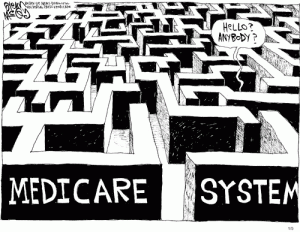Could this cut into the senior living/assisted living market?
I know I am not alone, but I am worried. . . actually greatly worried, that our industry, particularly assisted living and memory care, is plunging headlong into an abyss of too much capacity that is too expensive. This train is traveling down those tracks very rapidly even if market conditions remain the same, and they won’t.
Reinventing Senior Living
I came across this story at ABC news that talks about how a small, but likely growing, percentage of Baby Boomers are forming what we would have called, in the 60’s, communes. Most will not likely be houses with a constant haze of pot smoke and ever-changing mix and match sexual couplings. These new arrangements will initially be spawned out of economic necessity, but I predict that over time it will become a highly desirable model for at least 4 reasons:
- Cost – The beauty of the free market system is that it provides great incentive for innovation. We tend to think of this in terms of people wanting to get rich and likely this is the number one motivator. But free market also means sink or swim and this trend toward communal living will largely find deep roots in people not wanting to sink.
If my wife and I retired on just social security in Sacramento, where we currently live, we would not be able to afford to live in the house we live in, even if it were paid off. But if we added two more friends to the mix the shared costs would mean staying in a great house and, even more import, significant money to spend on our grandkids, travel or whatever we want.
- Companionship – In my view, today the most compelling benefit of senior living is that it provides a solution to the three plagues of loneliness, depression and boredom (using Eden Alternative terminology). Senior shared housing solves most or even all of those problems.
- Care – There is no doubt that if you had a group of elders living together in a single family home they would not be able to mutually provide all the ADL help needed in that household, but my guess is there would be a lot of mutual support that would result in a much reduced need for professional care-giving resources. Also, if personal care was required, there would be economies of scale as a care provider could care for multiple clients at one site.
- Purpose – In our rush to provide luxury accommodations for senior living communities we are wiping out the purpose for living. In a communal living environment the senior housemates need each other, reestablishing purpose in their lives. Instead of having activities thrust at them, the residents would need to, and be able to, create their own projects, outings and interests. As these homes would be more likely than large assisted living communities to be located in neighborhoods, picture an after school homework program.
There is potentially a very intriguing business opportunity here: helping seniors coordinate housing and services in a communal setting. What do you think? Would you live like this? Steve Moran If you like this article (or even if you don’t) it would be a great honor to have you subscribe to our mailing list HERE









Isn’t this actually a RETURN to “days of yore” when family and friends stayed together and cared for each other?
The 1970’s sit-com Golden Girls showed 4 older women living together successfully. I think I will be the Sophia in my group.
Kathleen it is exactly the same thing.
Steve
Lots of good ideas work for some in limited settings, but they don’t necessarily spell the “end of the age” or a “new era” in the industry. Does every good idea mean we need to “reinvent” senior living?
The Eden Alternative concept is great, and it works very well in the right setting, but it’s not for everyone. Group homes have been around for ages and there is definitely a place for them in the marketplace, but they are not a replacement for all segments of senior care.
Each of us should take a good, hard look at our communities and figure out for ourselves how we can best serve our seniors. We might just find that we’re doing things right already. If so, build on that!
This is a concept, cohousing, that will likely be useful for younger seniors:
http://www.cohousing.org/node/16
Which places senior housing right where it is evolving — when living on your own or even in cohousing is no longer feasible or desirable.
The demographics of the senior housing industry, quite different, are outlined here:
http://www.alfa.org/alfa/Assisted_Living_Resident_Demographics.asp
54% are 85 or older. That says quite a bit.
What is the senior housing industry doing to make its ‘independent’ living settings as appealing to younger seniors?
See Alternative Living for the Aging out of Los Angeles (Now Affordable Living for the Aging). It has been around since the early 1980s (maybe earlier) and has provided matching services for elders with homes who seek home-mates. There will likely be numerous emerging concepts. My favorite, and I’d like to explore more, is service or time banking. “Gray economies” (numerous meanings behind that) will undoubtedly emerge among people seeking lower cost, more personalized, more engaging alternatives.